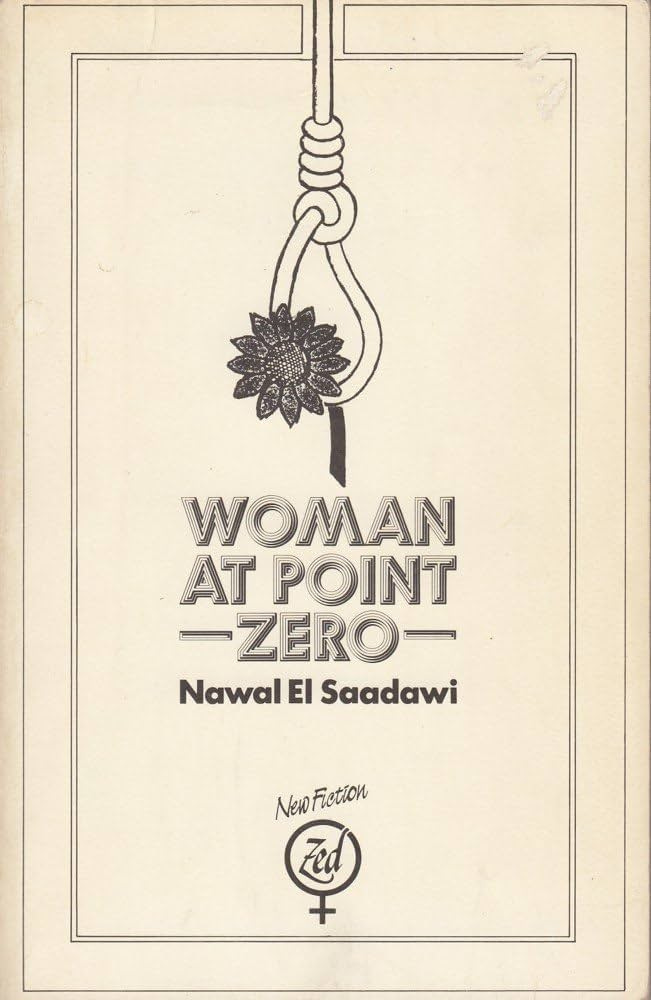Woman At Point Zero by Nawal El Saadawi
I abandoned ye not on the high seas / Yet on the dry land thou hast left me. / I bartered thee not for shining gold / Yet for worthless straw thou didst sell me / O my long night / O mine eyes. Oh.
Thanks, Anya, for recommending this book. You’re a true stock-picker among fiction.
Woman at Point Zero by Nawal El Saadawi, published in 1975, unfolds a gripping narrative through an interview between a psychiatrist and Firdaus, a woman on death row in Egypt for her alleged crimes. Firdaus' actions seem to be an inevitable response to a society that offers no respect to women, reducing them to the roles of either a wife or a prostitute.
This book evokes a core theme from The Unbearable Lightness of Being by Milan Kundera, where Teresa, trapped in a marriage with a serial cheater, endures out-of-body experiences and unsettling dreams. These dreams symbolize her existence as just another body among her husband’s desires, a mere object in a relentless line.
The writing in both novels captures an overwhelming lack of control, painting vivid pictures of being caught in the unforgiving currents of an ocean, under the constant gaze of watchful eyes. Firdaus describes her body much like Teresa does—as an object for men to possess, a commodity whose price rises throughout her life. This price is measured not just in money, but in the guise of affection and love, which Firdaus comes to see as mere disguises for lust.
In this world, men dominate, and women bend to their whims—beaten by husbands, seduced by bosses, bought for sexual gratification, and controlled by pimps or even other women who serve men. Firdaus is a body sold for “worthless straw,” while she herself never abandoned, never traded, always remained.
Yet, Firdaus does not remain passive. Her journey is one of losing and regaining power, culminating in her decision to kill the pimp and refuse the prince's money, asserting her final act of defiance. Just as in the lament of the abandoned: “I abandoned ye not on the high seas / Yet on the dry land thou hast left me,” Firdaus confronts her betrayal and subjugation. To truly be free, she must either embrace death or the complete destruction of the oppressive society around her. Her story is one of breaking free from the chains that bind her, choosing death over a life lived in chains.
I hope for nothing I want for nothing I fear nothing I am free.
Selections:
I abandoned ye not on the high seas / Yet on the dry land thou hast left me. / I bartered thee not for shining gold / Yet for worthless straw thou didst sell me / O my long night / O mine eyes. Oh.
‘Do you prefer oranges or tangerines?’
I looked into his eyes. They clearly said, ‘You’re a poor, miserable employee, unworthy of esteem, running after a bus to catch it. I’ll take you in my car because your female body has aroused me. It is an honour for you to be desired by a respected official like myself. And who knows, maybe some day in the future, I can help you to get a rise before the others.’
I came to realize that a female employee is more afraid of losing her job than a prostitute is of losing her life. An employee is scared of losing her job and becoming a prostitute because she does not understand that the prostitute’s life is in fact better than hers. And so she pays the price of her illusory fears with her life, her health, her body, and her mind. She pays the highest price for things of the lowest value.
I now knew that all of us were prostitutes who sold themselves at varying prices, and that an expensive prostitute was better than a cheap one.
When I was a prostitute I never gave anything for nothing, but always took something in return. But in love I gave my body and my soul, my mind and all the effort I could muster, freely. I never asked for anything, gave everything I had, abandoned myself totally, dropped all my weapons, lowered all my defenses, and bared my flesh.
My virtue, like the virtue of all those who are poor, could never be considered a quality, or an asset, but rather was looked upon as a kind of stupidity, or simple-mindedness, to be despised even more than depravity or vice.
A successful prostitute was better than a misled saint. All women are victims of deception. Men impose deception on women and punish them for being deceived, force them down to the lowest level and punish them for falling so low, bind them in marriage and then chastise them with menial service for life, or insults, or blows.
I hope for nothing I want for nothing I fear nothing I am free.
Revolutionary men with principles were not really different from the rest. They used their cleverness to get, in return for principles, what other men buy with their money. Revolution for them is like sex for us. Something to be abused. Something to be sold.
Men force women to sell their bodies at a price, and that the lowest paid body is that of a wife. All women are prostitutes of one kind or another. Because I was intelligent I preferred to be a free prostitute, rather than an enslaved wife. Every time I gave my body I charged the highest price.




